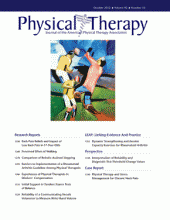<LEAP> highlights the findings and application of Cochrane reviews and other evidence pertinent to the practice of physical therapy. The Cochrane Library is a respected source of reliable evidence related to health care. Cochrane systematic reviews explore the evidence for and against the effectiveness and appropriateness of interventions—medications, surgery, education, nutrition, exercise—and the evidence for and against the use of diagnostic tests for specific conditions. Cochrane reviews are designed to facilitate the decisions of clinicians, patients, and others in health care by providing a careful review and interpretation of research studies published in the scientific literature.1 Each article in this PTJ series summarizes a Cochrane review or other scientific evidence on a single topic and presents clinical scenarios based on real patients or programs to illustrate how the results of the review can be used to directly inform clinical decisions. This article focuses on the use of exercise to manage symptoms of rheumatoid arthritis. Can dynamic exercise, both aerobic and strength training, improve function and well-being in individuals with rheumatoid arthritis?
Rheumatoid arthritis (RA) is a systemic autoimmune disease with a prevalence of 0.5% to 1% of the adult population in northern Europe and North America and a slightly lower percentage of adults in other parts of the world.2,3 Rheumatoid arthritis greatly affects function.2 The predominant feature of RA is symmetrical polyarthritis, often first affecting the hands and feet. Over time, chronic synovitis can lead to joint destruction. If untreated, nearly 10% of individuals affected with RA develop joint deformities within 2 years of diagnosis. Thus, early aggressive medical therapy is recommended to prevent joint and tissue damage.4 Data indicate that people with RA are 33% to 55% weaker compared with matched controls who are healthy due to atrophy of type I and type …












